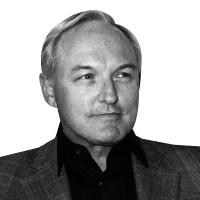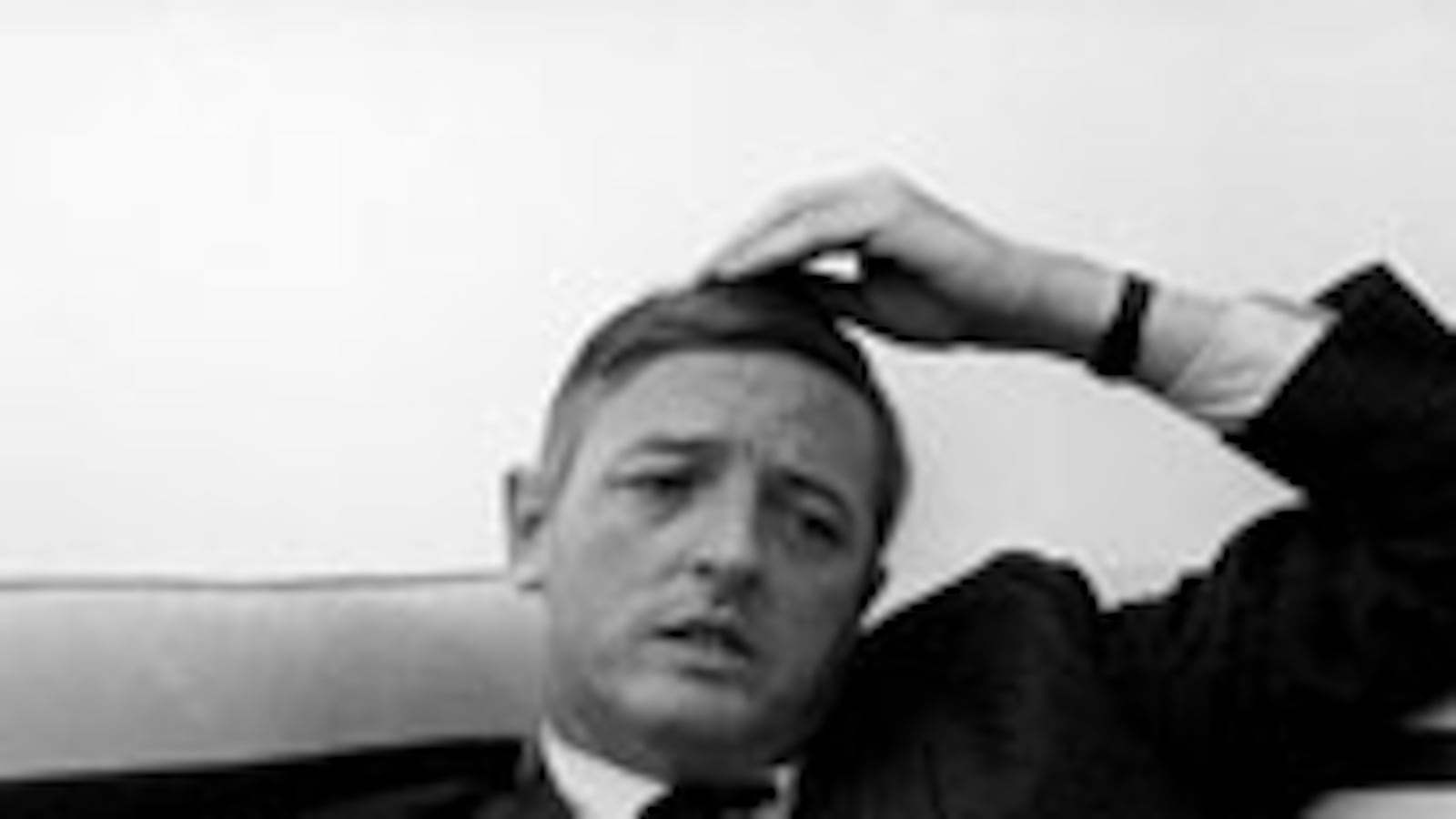
My father, William F. Buckley, Jr, died a year ago this week, and I thought to mark the occasion in this space, normally devoted to making raspberries at the cosmos and endorsing Democrats for high office.
I’ve found myself reaching for the phone so many times since last February 27, not just to hear his voice, but to ask him what—on earth—he would have made of (in no particular order): Sarah Palin, the future of the GOP, John Thaine’s $35,000 commode, these trillion-dollar “stimulus” programs, Senator Roland Burris, Caroline Kennedy’s about-face, Judd Gregg’s about-face, the on-going nationalization of the U.S. banking industry, and President Obama as he deals with one of the worst in-boxes in U.S. history.
I lost (or misplaced) my faith, but I find myself on this anniversary hoping that I’m wrong, and that he’s there, correcting God’s grammar.
It’s tricky, trying to channel your father’s ghost. Hamlet tried it. I think I won’t. But I miss WFB’s takes on—everything that’s going on.Often, I’d find myself flailing aimlessly or circularly about some issue, trying to sort it out in my own head. Then I’d ring him and he’d nail it for me in two or three neat sentences that left me laughing and shaking my head, for the thousandth time, in amazement. Even if I suspected he might be wrong, he was always elegantly wrong.
He died at his desk in Stamford, Connecticut, while working on a book.He’d been ill for many months, worn down by emphysema. His wife of 57 years had died ten months earlier, and he missed her desperately.A DVD had been made of her memorial service, with a PowerPoint slide show I’d assembled of dozens of photos of her through the years. He watched it again and again, tears streaming down his face. I understand now, the business of long-time mates not outliving each other by long.
My father was a man of devout, unflinching, sometimes exasperating Catholic faith. He believed absolutely in heaven and hell. I lost (or misplaced) my faith, but I find myself on this anniversary hoping that I’m wrong, and that he’s there, correcting God’s grammar. I have on my desk an editorial cartoon showing him arriving at the Pearly Gates, St. Peter whispering to an angel, “I’m going to need a bigger dictionary.”
I got the phone call at 9:30 in the morning—I’d been doing my income taxes; death and taxes, all in the same day.I’d been mentally preparing for this day for months, and yet when it finally happens it comes embedded in a shock wave. I actually found myself thinking, Maybe I’ll just go on doing the taxes. That way no one will notice it’s happened. After taking a few deep breaths, I made my calls and sent out the first emails.
The New York Times had his obituary up on its website within an hour and a half.His death was announced from the White House, and a few minutes after that, the President of the United States called to express his condolences. I had always known my father was a great man—great, that is, in the literal sense of the word. He changed the era he lived in. The reaction to his death, from far corners of the world, confirmed this for me, not that it mattered. To the world he was William F. Buckley, Jr. To me, he was “Pup.”
I buried him in Sharon, Connecticut, where he grew up and where he had been, by his own admission, happiest, between the ages of five and seven. A month later, his funeral mass was held at Saint Patrick’s Cathedral in New York, in front of a full house of 2,200 souls.
Jews observe a formal period of one year’s mourning for a parent, called an avelut. We aren’t Jewish, but I get, and like, the idea, even though I don’t suppose the mourning ever really ends, until one’s own time comes. In the meantime, ave atque vale.The eulogy I gave at St. Pat’s I reproduced here, below.
We talked about this day, he and I, a few years ago. He said to me, “If I’m still famous, try to convince the Cardinal to do the service at St. Patrick’s. If I’m not, just tuck me away in Stamford.”
Well, Pup, I guess you’re still famous.
Pope Benedict will be saying Mass here in two weeks. I was told that the music at this mass for my father would in effect be the dress rehearsal for the Pope’s. I think that would have pleased him, though doubtless he’d have preferred it to be the other way around.
On the day he retired from Firing Line after a 33-year long run, Nightline (no relation) did a show to mark the occasion. At the end, Ted Koppel said, “Bill, we have one minute left. Would you care to sum up your 33 years in television?” To which my father replied, “No.”
Taking his cue, I won’t attempt to sum him up in my few minutes here. A great deal has been written and said about him in the month since he died, at his desk, in his study in Stamford. After I’d absorbed the news, I sat down to compose an email. My inner English major asserted itself and I found myself quoting (misquoting, slightly) a line from Hamlet,
He was a man, Horatio, take him for all in all, I shall not look upon his like again.
One of my first memories of him was of driving up to Sharon, Connecticut for Thanksgiving. It would have been about 1957. He had on the seat between us an enormous reel-to-reel tape recorder. For a conservative, my old man was always on the cutting edge of the latest gadgetry—despite the fact that at his death, he was almost certainly the only human being left on the planet who still used Word Star.
It was a recording of MacBeth. My five-year old brain couldn’t make much sense of it. I asked him finally, “What’s eating the queen?” He explained about the out-out-damned spot business. I replied, “Why doesn’t she try Palmolive?” So began my tutelage with the world coolest mentor.
I placed inside his casket a few items to see him across the River Styx: his favorite rosary, the TV remote control—private joke—a jar of peanut butter, and my mother’s ashes. I can hear her saying, “ Bill—what is that dis-gusting substance leaking all over me?” No pharaoh went off to the afterlife better equipped than he does.
The last time I was with him in Sharon was last October. It was a fundraiser for the local library, billed as “A Bevy of Buckleys”—my father, Uncle Jimmy, Aunt Pitts, Aunt Carol, me—reading from the aggregate Buckley oeuvre—a word I first heard from his lips many years ago, along with other exotic, multi-lingual bon mots: mutatis mutandis; pari passu; quod licet Jove, non licet bovi.
An article had appeared in the local paper a few days before, alerting the community to this gala event. As I perused the clipping, my eyes alighted on the sentence: “The Buckleys are a well-known American family, William F. Buckley being arguably the best known.”
I concealed my amusement, and handed Pup the clipping and waited for the reaction I knew would come. Sure enough, within seconds, he looked up with what I would describe as only faintly bemused indignation and said, “ Ar-guably?”
He was—inarguably—a great man. This is, from a son’s perspective, a mixed blessing, because it means having to share him with the wide world. It was often a very mixed blessing when you were out sailing with him. Great men always have too much canvas up. And great men set out from port in conditions that keep lesser men—such as myself—safe and snug on shore.
One October day in 1997, I arrived from Washington in Stamford for a long-planned overnight sail. As the train pulled into the station, I looked out and saw people hanging onto lampposts at ninety-degree angles, trying not to be blown away by the northeast gale that was raging. Indeed, it resembled a scene from, “ The Wizard of Oz.” When the train doors opened, I was blown back into the carriage by the 50 mile-an-hour wind. I managed to crawl out onto the platform, practically on all fours, whereupon my father greeted me with a chipper, “We’ll have a brisk sail.”
I looked up at him incredulously and said, “We’re going out in this?”
Indeed we did go out in it.We always went out in it. Some of my earliest memories are of my mother, shrieking at him as the water broke over the cockpit and the boat pitched furiously in boiling seas, “Bill— Bill! Why are you trying to kill us?”
But the cries of timorous souls never phased him. He had been going out in it for years, ever since he published his first book, God and Man At Yale.Nor did he need a sailboat to roil the waters. His Royal typewriter—and later, Word Star—would suffice.
How many words flowed from those keyboards.I went up to Yale recently to inspect his archive of papers. They total 550 linear feet. To put it in perspective, the spire of St. Patrick’s rises 300 feet above us. By some scholarly estimates, he may have written more letters than any other American in history. Add to that prodigal output: six thousand columns, 1500 Firing Lines, countless articles, over 50 books. He was working on one the day he died.
Jose Martí famously said that a man must do three things in life: write a book, plant a tree, have a son. I don’t know that my father ever planted a tree. Surely whole forests, whole eco-systems were put to the axe on his account. But he did plant a lot of seeds and many of them, grown to fruition, are here today.Quite a harvest, that.
It’s not easy coming up with an epitaph for such a man. I was tempted by something Mark Twain once said, “Homer’s dead, Shakespeare’s dead, and I myself am not feeling at all well.”
Years ago, he gave an interview to Playboy Magazine. Asked why he did this, he couldn’t resist saying, “In order to communicate with my 16—year old son.” At the end of the interview, he was asked what he would like for an epitaph and he replied, “ ‘I know that my Redeemer liveth.’” Only Pup could manage to work the Book of Job into a Hugh Hefner publication.
I finally settled on one, and I’ll say the words over his grave at sunset today in Sharon, as we lay him to rest. They’re from a poem he knew well, each line of which, indeed, seemed to have been written just for him:
Under the wide and starry sky Dig the grave and let me lie. Glad did I live, and gladly die. And I lay me down with a will.
This be the verse you grave for me: Here he lies where he longed to be. Home is the sailor, home from sea, And the hunter home from the hill.
Christopher Buckley’s books include Supreme Courtship, The White House Mess, Thank You for Smoking, Little Green Men, and Florence of Arabia. He was chief speechwriter for Vice President George H.W. Bush, and the founder and editor-in-chief of Forbes FYI.






